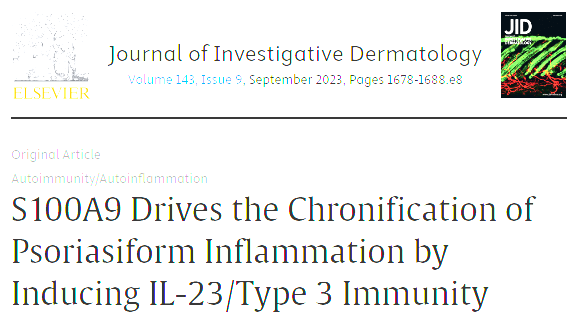S100A9 Drives the Chronification of Psoriasiform Inflammation by Inducing IL-23/Type 3 Immunity
Psoriasis is a chronic inflammatory skin disorder driven by the IL-23/type 3 immune response. However, molecular mechanisms sustaining the chronicity of inflammation and psoriatic lesions remain elusive. Combining systematic analyses of several transcriptomic datasets, we delineated gene signatures across human psoriatic skin, identifying S100A9 as one of the most up-regulated genes, which was confirmed in lesioned skin from patients with psoriasis and preclinical psoriasiform skin inflammation models. Genetic ablation or pharmacologic inhibition of S100A9 alleviated Aldara-induced skin inflammation. By single-cell mapping of human psoriatic skin and bone marrow chimeric mice experiments, we identified keratinocytes as the major source of S100A9. Mechanistically, S100A9 induced IL-23 production by dendritic cells, driving the IL-23/type 3 immunity in psoriasiform skin inflammation. In addition, the cutaneous IL-23/IL-17 axis induced epidermal S100A9 expression in human and experimental psoriasis. Thus, we showed an autoregulatory circuit between keratinocyte-derived S100A9 and IL-23/type 3 immunity during psoriasiform inflammation, identifying a crucial function of S100A9 in the chronification of psoriasis
Authors
Silva de Melo BM, Veras FP, Zwicky P, et al.
External link
Publication Year
Publication Journal
Associeted Project
Microbiology or Immunology
Lista de serviços
-
Is the gut microbiome key to modulating vaccine efficacy?Is the gut microbiome key to modulating vaccine efficacy?
-
Toxicogenomic and bioinformatics platforms to identify key molecular mechanisms of a curcumin-analogue DM-1 toxicity in melanoma cells.Toxicogenomic and bioinformatics platforms to identify key molecular mechanisms of a curcumin-analogue DM-1 toxicity in melanoma cells.

